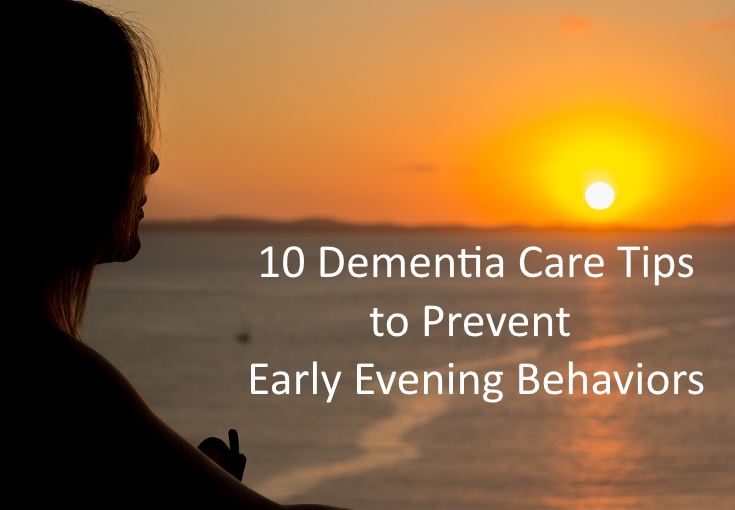This piece originally appeared on TogetherinThis.com and included the following note. -CT
Editor’s Note: The term “Sundowning” is sometimes used as a negative label which can be damaging to the care provided, and results in unjust stereotyping. This contributes to approaches to care that focus on weakness rather than strength, illness rather than wellness, and victims rather than whole persons. It’s important, as the author states, to look at any behaviors as a form of communication. This will help you discover, and hopefully, address the trigger that is negatively affecting your loved one. Learn More. -Mike Good
Contributing Writer: Christy Turner, founder of Dementia Sherpa
You’re a dementia care partner. You’ve just been through a “sundowning” episode. You’re exhausted, and so is your person living with dementia. You’d do virtually anything to never go through that again.
You may be looking for a quick, easy fix – who doesn’t love a quick, easy fix?! But this is one area where putting in some time and effort up front is going to pay huge dividends down the road.
1. Start by noting what time it started. Going forward, make sure your person is involved in a structured activity about 30 minutes before that.
Need ideas? Check out 101 Things to Do with a Person with Dementia. Just choose what looks good and then move on to #2 below.
2. Routine is the name of the game. Structure and routine are your best friends. Yes, it’s good to be flexible and roll with the unexpected, but that’s for you.
For your loved one, keep it very predictable. This significantly reduces anxiety.
3. Use lavender or geranium essential oils. Keep them in a diffuser in the bedroom and living room, spritz some on a shirt collar, and also look for complementary bath products.
4. Eliminate boredom. These behaviors are communication, albeit communication expressed in a way you don’t like.
By this point in the disease process, this type of communication feels necessary to people living with dementia;
It’s possible they can’t be left to their own devices to figure out what to do, because they may no longer be able to hold on to a thought long enough to carry it through to a meaningful action.
They need you to provide visual cues and coach them through it.
Bonus: Active people sleep better at night (and have few problems with constipation, which can be another root cause of “sundowning,” in the sense that your person is trying to tell you there’s a problem!).
On the other hand, don’t run someone ragged, either. Extreme exhaustion and over-stimulation lead straight back to “sundowning.”
6. Keep all the lights on until it’s time to start the bedtime routine. Again, visual cues are much easier for people living with dementia to understand.
7. Recognize reality. Dementia isn’t a cure for waking up on the wrong side of the bed any more than it’s a cure for feeling emotions. Sometimes, people just have a bad day. It happens.
8. Routine physical affection helps generate positive feelings throughout the day. For both of you.
9. Offer plenty of reassurance throughout the day. You know you’ve said “I love you” or “I’ll protect you” or “You’re safe with me” ten times by noon…but your person likely doesn’t remember.
Repeat loving reassurances often. Pro tip: Every time you’re about to blurt out, “Remember?” in frustration, turn it into “I love you!” instead.
10. Remember to HALT! Feeling Hungry, Angry, Lonely, or Tired can lead to undesirable “behavior” in everyone.
Anticipate and attend to those needs throughout the day. Pro tip: More than one of those needs can exist at the same time, so check for each every couple of hours throughout the day.
For even more insight on what it’s like for a person living with dementia trying to communicate with you, check out Christy’s article:



